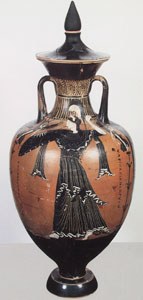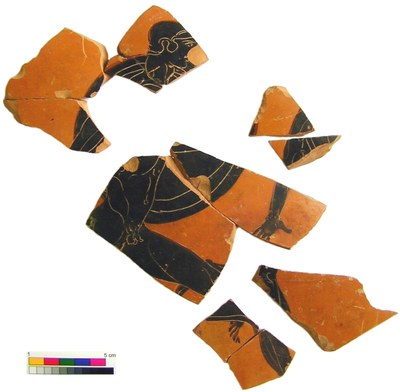Panathenaic Price Amphorae
The vessels for the prize oil for the victorious athletes at the great Panathenaea held every four years in honour of the city goddess Athena are one of the most unusual genres within Greek vase painting.
 |
 |
Athens, National Museum Inv. 2004, from Eretria, 1969.
Dating: Archonts' inscription "Charikleides", 363/2 B.C. Pourtalés Painter
A: Athena, representations of Nike on columns
B: Wrestling match, Nike, referee, watching athlete
Produced without traceable interruption from the 6th century BC to the Roman period, they are bound to a specific vessel form, a particular painting technique and a fixed repertoire of pictorial themes.
The patron and primary function are known and they have survived in large numbers.
In collaboration with M. Bentz and other specialists in this field, N. Eschbach is developing a comprehensive database with approx. 4000 vessels and fragments to date. A significant part consists of the approx. 800 fragment groups from the Kerameikos in Athens, which N. Eschbach is preparing for publication.
Publication:
M. Bentz - N. Eschbach (Hrsg.), Panathenaika. Symposion zu den Panathenäischen Preisamphoren, Rauischholzhausen 25.11.-29.11.1998 (2001).
Subproject 1: The fragments of Panathenaic prize amphorae from the Kerameikos, Athens
Almost every excavation on the site of the most important necropolis of the city of Athens also brings to light fragments and fragment groups of Panathenaic prize amphorae. More than 2000 individual fragments, combined into approx. 800 catalogue numbers, are currently being prepared for publication. The collection of vessel fragments from the 4th century BC and the Hellenistic to Roman periods is very extensive.

Athens, Kerameikos, Magazine Inv. PA 656
B-side: Hoplitodromos. Body parts of three athletes.
Archontate of Neaichmos (320/19 B.C.)
Publication:
N. Eschbach, Panathenaic prize amphorae from the Kerameikos: some new aspects and results, in: O. Palagia - A. Choremi (Hrsg.), The Panathenaic Games. Papers of the International Conference, 11-12/5/2004 (2007).
Subproject 2: Athens, Odos Lembesi- Porinou, Tomb III (1969)
In addition to the holdings at the Kerameikos in Athens, three other extensive and important find groups of Panathenaic prize amphorae are still unpublished. Thanks to the permission of the 3rd Ephory of Prehistoric and Classical Antiquities, Athens, two find groups can now be published. The find on the Odos Lembesi-Porinou site comprises numerous fragments of possibly 10 vessels from the 2nd half of the 4th century BC, including an almost complete amphora.
The project is funded by the Gerda Henkel Foundation.

Athens, Magazine of the 3rd Ephoria, Inv. A 6367
A-side: Athena, part of the shield (interior view).
Figures on the right column: Aphrodite and Plutos (?)
Archontate of Lykiskos (344/3 BC)
Publications:
O. Alexandri, ADelt 25 B, 1970, 71 Taf. 62.
M. Bentz, Panathenäische Preisamphoren. Eine athenische Vasengattung und ihre Funktion vom 6.-4. Jh. v. Chr.
Subproject 3: The Athens Find, Odos Achilleos-Plataion (1966)
There is contradictory information about this find in an early Hellenistic waste pit on the site: there are said to be up to eight prize amphorae of one and the same year, from the archontate of Polemon 312/11 BC. A first recording of both groups of finds (subprojects 2 and 3) was made in Nov. 2007. According to this, an almost complete amphora and partly extensive fragment groups of a total of 12 vessels of this year have been recovered. The hitherto completely unknown pictorial design of these vessels is surprising in many respects - and of extraordinary quality!
The project is funded by the Gerda Henkel Foundation.

Athens, Magazine of the 3rd Ephoria, Inv. A 3801
B-side: Referee, head and shoulder of a wrestler.
Archontate of Polemon (312/11 B.C.)
Publications:
O. Alexandri, ADelt 25 B, 1970, 71 Taf. 62.
M. Bentz, Panathenäische Preisamphoren. Eine athenische Vasengattung und ihre Funktion vom 6.-4. Jh. v. Chr.
Contact: apl. Prof. Dr. Norbert Eschbach
